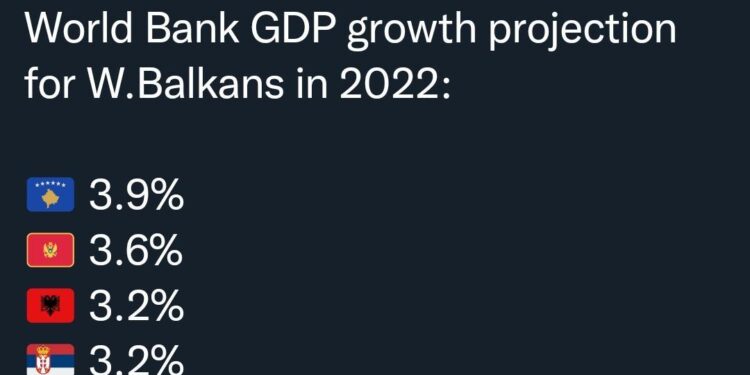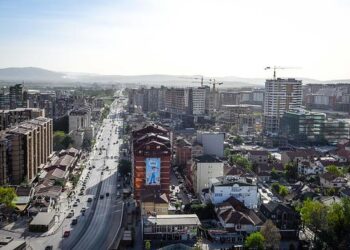Reassessing Kosovo’s Economic Prospects: A New Direction
Recent assessments from Kosovo’s central banking authority reveal a notable deceleration in the nation’s economic growth, with forecasts indicating a drop to 4.2% by 2025. This projection underscores significant shifts within the economic landscape of this Balkan country as it grapples with numerous challenges,including rising inflation,supply chain disruptions,and geopolitical tensions. While Kosovo has experienced considerable economic advancement in recent years, this adjustment signifies a pivotal moment for policymakers and stakeholders dedicated to fostering regional development. As the nation prepares for these impending challenges, understanding the ramifications of this forecast is essential for both local communities and international observers.
Economic Contraction in Kosovo Amid Global Uncertainties
Kosovo is on track to experience a substantial slowdown in its economy, with expected growth tapering off to 4.2% by 2025, according to insights from its central bank. This downturn is occurring against a backdrop of increasing global uncertainties, which are begining to affect various sectors within its economy. Factors contributing to this situation include surging inflation rates, fluctuations in remittances from abroad, and challenges faced by domestic industries. Analysts suggest that while certain sectors may show resilience, the overall economic climate will likely remain cautious as Kosovo navigates these turbulent times.
The central bank has pinpointed several critical areas that could influence this economic outlook:
- Inflationary Pressures: Rising prices for essential goods are diminishing consumer purchasing power.
- Investment Instability: foreign direct investment has become increasingly erratic due to geopolitical conflicts.
- Labor Market Challenges: Discrepancies between available skills and market demands hinder job creation across key growth sectors.
Despite these obstacles, there are promising developments within specific industries such as technology and renewable energy that may provide some buffer against broader economic declines. The focus will be on fostering innovation while building a more diversified economic base to mitigate external risks.
| Year | Projected GDP Growth (%) |
|---|---|
| 2023 | 5.0% |
Navigating Opportunities Amidst Economic Challenges in Kosovo
the latest projections from Kosovo’s central bank indicate an alarming trend towards slowing growth expected at just 4.2% by 2025 . This downward trend presents significant hurdles for policymakers, businesses, and citizens alike due to several contributing factors:
- Weak External Demand : A sluggish global recovery could negatively impact exports , leading local industries towards diminished revenue .
- Inflationary Pressures : Rising costs might curtail consumer spending , creating ripple effects throughout domestic consumption .
- Political Instability : Ongoing tensions can deter foreign investments , which are crucial for stimulating economic expansion .
A silver lining exists amid these challenges; opportunities abound if Kosovo recalibrates its growth strategy effectively . The government can channel investments into high-potential sectors like technology or renewable energy , fostering innovation alongside job creation . Additionally , initiatives aimed at enhancing regional trade partnerships could significantly boost exports . Key strategic areas ripe for development include :
- Infrastructure Enhancement : Upgrading transport networks can improve connectivity ,attracting further investment opportunities .
- Skills development Initiatives : Aligning educational programs with market demands will prepare workers adequately for emerging job markets .
- Leveraging Diaspora Networks : Engaging Kosovars living abroad can tap into both financial resources & expertise beneficially enriching local economies .
- Skills development Initiatives : Aligning educational programs with market demands will prepare workers adequately for emerging job markets .
Strategic Measures Needed To Sustain Economic Growth In Kosovo
Kosovo must implement strategic actions aimed at boosting productivity while encouraging investment if it hopes navigate through projected slowdowns downwards towards an anticipated rate of4%. By 2025!
- Enhancing Infrastructure :  ; prioritizing transportation & digital infrastructure investments improves connectivity attracting foreign capital inflows.
- Supporting SMEs :  ; Providing financial assistance along technical support enables small medium enterprises drive innovation create jobs.
- Education Training Programs:  ; Aligning curricula labor market needs equips workforce necessary skills boosting employability prospects.
Further international collaboration trade partnerships play pivotal roles maintaining momentum proposed actions include :
- Diversifying Export Markets: Engaging bilateral multilateral agreements reduces dependency customary markets.















